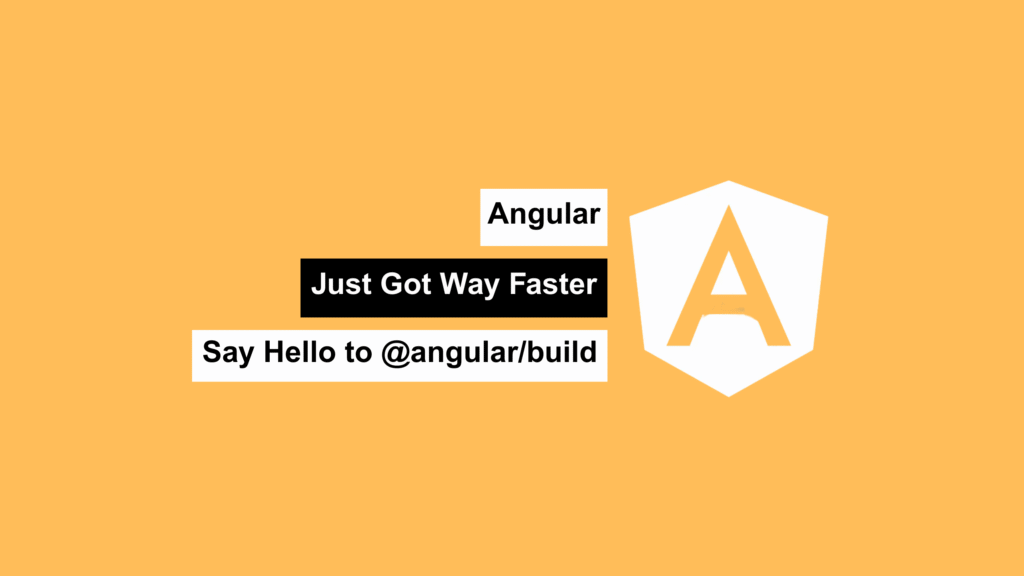
The Angular team has officially launched a brand-new builder: @angular/build — and it’s a total game-changer. It replaces the long-standing @angular-devkit/build-angular, and the difference? It’s like switching from dial-up to fiber. ⚡
Let me walk you through why this matters and how it’s already transforming Angular dev workflows.
🧱 Why This Change Is a Big Deal
For years, Angular’s build system relied on Webpack. It worked. It scaled. But it wasn’t exactly fast. Meanwhile, the rest of the JS tooling world has been moving towards lightweight, blazing-fast bundlers like esbuild and Vite.
Now, with Angular 20, the framework is catching up — and in some ways, even pulling ahead — by adopting esbuild under the hood through @angular/build.
That means faster builds, leaner tooling, and a smoother development experience across the board.
⚙️ What’s New with @angular/build
| Feature | Old Builder (@angular-devkit/build-angular) | New Builder (@angular/build) |
|---|---|---|
| Install Size | ~291 MB | ~115 MB |
| Build Time | Webpack (slower) | ⚡ 5x faster with esbuild |
| Dev Server Startup | Laggy | 🚀 4x faster |
| Modern Tooling Support | Limited | ✅ Built-in |
These aren’t just benchmark numbers — devs (including me) are actually seeing build times drop from minutes to seconds. It’s a noticeable difference, even on local machines.
🔄 What’s Actually Changing?
The core switch is simple:
- Old builder:
@angular-devkit/build-angular:application - New builder:
@angular/build:application
Behind the scenes, @angular/build uses esbuild, eliminating most of Webpack’s overhead while keeping all the Angular goodness intact.
🧠 Should You Migrate?
Short answer: you don’t have to right now, but you definitely should plan for it.
✅ For New Projects
If you’re starting fresh with Angular 20:
ng new my-fast-app
Boom — you’re already using @angular/build out of the box.
🛠 For Existing Projects
Still on the legacy builder? It’s fully supported — no forced migration.
But if you want that speed boost, switching is easy. Update your angular.json:
"builder": "@angular/build:application"
Soon, the CLI will offer automatic migration tools to make the transition smoother.
🏎️ Why esbuild Is a Massive Upgrade
In case you’re wondering what all the hype is about:
- Written in Go → super fast execution
- Zero-config startup — simpler dev experience
- Built-in TypeScript & JSX support
- Efficient tree-shaking
- Already used by Vite, SvelteKit, and more
With Angular embracing esbuild, we’re saying goodbye to sluggish builds and bloated setups — and hello to modern tooling that just works.
💻 What You’ll Notice Instantly
Switching to @angular/build feels like lifting a weight off your dev workflow:
- 🔄 Live reloads feel nearly instant
- 🏗️ Builds drop from minutes to seconds
- 🧪 CI/CD pipelines become leaner and faster
- 🆕 New devs won’t complain about massive installs
This isn’t just a backend change — it genuinely improves how Angular feels during day-to-day work.
🔮 What This Signals for Angular’s Future
Angular’s not just chasing trends — it’s setting the tone for a leaner, faster, more reactive ecosystem.
This update aligns with the broader vision:
- ✅ Signal-based reactivity (production-ready)
- ✅ Standalone components (no more bloated modules)
- ✅ Zoneless rendering (no more Zone.js headaches)
Combined with @angular/build, it’s clear: Angular is getting lighter, faster, and more developer-friendly.
🧾 TL;DR
- Angular 20 introduces
@angular/build, powered by esbuild - 60% smaller install size, 5x faster builds, 4x faster dev server
- New apps use it by default
- Existing apps can migrate easily — no breaking changes
- Angular is officially modernizing its build pipeline
📣 Final Thoughts
This is the Angular upgrade we’ve been waiting for. @angular/build doesn’t just make things faster — it completely changes the dev experience.
So whether you’re building internal tools or enterprise apps, this new builder delivers:
- 💨 Speed
- 🧹 Simplicity
- 🧠 Modern developer experience
